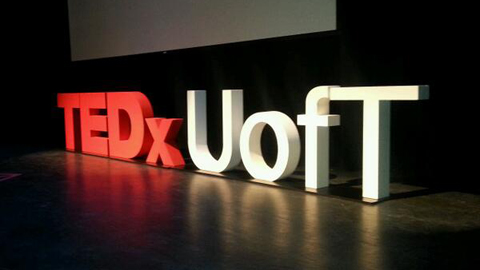
Achieving the impossible is all in a day’s work for speakers at this year’s TEDxUofT. Four members of the Faculty of Applied Science & Engineering community were among the 12 speakers at Saturday’s event, which featured astonishing talks on topics from invisibility cloaking to human-powered flight, revolutionizing the drug development pipeline to overhauling democracy.
George Eleftheriades, a professor of electromagnetics in The Edward S. Rogers Sr. Department of Electrical & Computer Engineering, gave the audience a crash course in metamaterials, an emerging field that’s inventing new materials with properties that don’t exist in nature. Professor Eleftheriades has used metamaterials to develop a super-microscope that resolves images on a micrometer scale, lenses for improving MRI technology, and recently he and a PhD student demonstrated the world’s first thin, active invisibility cloak in their laboratory.
Professor Eleftheriades explained the electrical engineering approach he and his student took to develop the new active cloaking technique, using specifically attuned electromagnetic waves to cancel any light, radio or x-ray radiation reflecting off the object to be cloaked. Cancelling these reflective waves renders the object invisible, without needing to physically cover or coat it with a thick metamaterial shell. “The cloak doesn’t depend on the size of the object, the shape of the object, or the composition of the object,” said Professor Eleftheriades. “I think the collective goal is to see these in use in the relatively near future.”
Engineering alumni Todd Reichert (EngSci 0T5, PhD 1T1) and Cameron Robertson (EngSci 0T8, MASc 0T9) kicked off the day with a talk on the importance of failure. “Don’t be afraid to fail – fail early and fail often,” said Robertson. “Small failures are key to invention and innovation.”
Invention and innovation are Reichert and Robertson’s calling card – together they founded AeroVelo, their company for building, testing and amazing the world with various types of human-powered vehicles. In June 2013, their team’s Atlas Human-Powered Helicopter took home the American Helicopter Society’s Igor I. Sikorsky Prize worth $250,000 – the prize had never been won in the 33 years since its establishment.
Reichert and Robertson spoke about the trials and tribulations they faced in building and testing the Atlas and other high-speed human-powered vehicles. “The question is not ‘Do we have the time to succeed?’ it’s ‘Do we have the time to fail?'” said Reichert. “And if we don’t have time to fail, we don’t have time to innovate.”
“Navigating the space between failure and success is really navigating the space between doubt and confidence,” he added. This fall AeroVelo will be trying to break the human-powered speed record, currently held at 134 kilometres per hour.
IBBME’s Professor Alison McGuigan spoke of revolutionizing the current slow and expensive drug development pipeline with a Swiss roll.
Today, promising drugs are first tested inexpensively in the lab. If they perform well, they advance to more expensive animal trials, then onto terribly expensive and time-consuming human trials. The average time to get a drug discovery to market is 12 years, she said. But she and her research group may change all that by increasing the quality of lab testing protocols – in essence, giving drugs a better chance of failing early and cheaply, before advancing needlessly to animal or human trials.
“Our 2D plastic dishes with no variation don’t predict our 3D human environment where there’s lot of variation,” said Professor McGuigan.
McGuigan’s group has developed a way to simulate the complex nature of a tumour in the body by arranging tumour cells on a two-dimensional substrate and rolling it up into a three-dimensional configuration, like a Swiss roll, the popular dessert cake. This makes it easy to test the efficacy of new drugs with thorough knowledge of where each cell was located and how well each cell responded to treatment.
“Being able to get this information easily is very important,” said Professor McGuigan. “Going forward, we can imagine taking this a step further and introducing genetic variation.”
The diversity of the 2014 TEDxUofT speaker list underlined the breadth of cutting-edge research and thinking being carried out across the university by undergraduates, graduate students, faculty and alumni.
“I think it’s a good idea to disseminate to the general public what we do here at U of T,” said Professor Eleftheriades. “It’s good to show society that we’re doing interesting things here – things that are a good use of taxpayers’ money.”
TEDx is a program of local, self-organized events that bring people together to share a TED-like experience, in the spirit of the TED mantra of “ideas worth sharing.”




